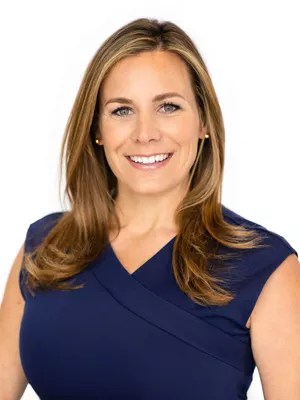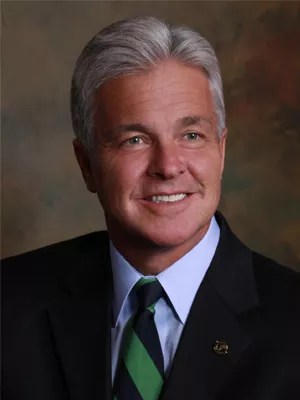
Getty Images/Westword Illustration

Audio By Carbonatix
Although the Common Sense Institute has been a major player in Colorado policy debates over the past decade, the think tank has really been punching above its weight in the last few months.
In August 2021, the institute released the first half of a report on homelessness in metro Denver whose revelations grabbed headlines not just in Colorado, but on national outlets such as Fox News. In December, it issued an analysis of Colorado’s crime wave by former district attorneys George Brauchler and Mitch Morrissey, which caused even more of a stir.
“CSI is a huge value to the state because we do examine the fiscal impacts unlike any other think tank out there, and have the economic tools to provide Coloradans – individuals, families and lawmakers – the facts on the economy and individual opportunity,” says Kristin Strohm, president and CEO of the institute. “Without CSI, there would be a huge void in the state related to facts and data. We’re really proud of that, and the role we’ve had in the public-policy debate.”
But the Common Sense Institute also has its detractors, who say that the organization’s research is driven ideologically toward a certain conclusion, then works backward for the desired results.
Does CSI really offer common sense…or nonsense?

Kristin Strohm heads the Common Sense Institute.
CSI
Colorado has long been home to a wide array of think tanks. Some make international news, like the Telluride Institute, co-founded in the ’80s by Megatrends author John Naisbitt, who passed away last year. Today the Aspen Institute grabs international headlines.
Then there’s the Independence Institute, which comes at issues from a libertarian perspective. To the left are the Colorado Fiscal Institute and the Bell Policy Center, to the right the Centennial Institute at Colorado Christian University. Some think tanks are more specialized in their focus, including the Colorado Center on Law and Policy, which often works on housing issues, and Western Resource Advocates, which homes in on environmental issues.
The Common Sense Institute joined the lineup over a decade ago.
“We were founded just over eleven years ago by a concerned group of business leaders in the community who felt like, at the policy-level discussion, there really lacked concrete data and facts around potential solutions to move the state forward,” recalls Strohm, who was one of the group’s co-founders.
When it was founded, CSI was known as the Common Sense Policy Roundtable and billed itself as a “free enterprise” think tank; it changed its name to the Common Sense Institute in 2020. “Common Sense Policy Roundtable is a mouthful,” Strohm says. “We rebranded as an institute, which has been a lot easier.”
Although the name has changed, the focus on using an econometric model to analyze potential policies remains.
“Say, for instance, there’s a tax increase proposal” at the Colorado Legislature, Strohm says. “The legislative council will give that a fiscal note that really just says the tax increase will raise this much more revenue. That doesn’t take into account dynamic impact – like how there will be less money in disposable income in an individual’s pocket.
“This really is a tool for the public,” she adds. “We want this to help inform and educate the public.”
The group describes itself as non-partisan, but CSI is not exactly ideologically neutral.
Strohm has a background in conservative politics. She served as president of the Starboard Group, a political fundraising and consulting firm that has a history of working with Republican candidates and causes. She’s married to Josh Penry, a Republican who served as the minority leader in the Colorado Senate and is now a political consultant himself.
CSI is non-partisan “in name only,” says Ian Silverii, a Democratic operative and Denver Post columnist who’s married to Democratic lawmaker Brittany Pettersen, now a candidate in Colorado’s 7th Congressional District. “And they have to do that to maintain their 501(c)(3) tax status. … They should not be allowed to walk around pretending like they don’t have preferred electoral outcomes in mind, which is to elect more Republicans.”
CSI “exists to promote a conservative agenda and, indirectly, Republican candidates,” says Ari Armstrong, a libertarian thought leader in Colorado. “Not that there’s anything wrong with that. That’s pretty standard in the policy world.”
But Strohm pushes back on the assertion that CSI tilts Republican or conservative.
“I think the facts are the facts. Look at our team members. Look at our board. It’s not true. We haven’t really felt the need to respond to it,” Strohm says. “Our team includes Rs and Ds and Us. We believe at the core that we cannot drive forward toward attainable proactive solutions unless we all come together.”
But a look at the board and team shows that CSI definitely skews Republican.
While CSI has brought on a bipartisan range of fellows, the ten-person staff of the organization includes at least six people who have worked in Republican or conservative politics. The thirteen-person board leans even further to the right, and it’s filled with Republican donors. CSI’s board chair, Earl Wright, who is the co-founder and chairman of the board for AMG National Trust Bank, has donated at least $135,000 to Republican candidates and campaigns since 2010, according to state campaign finance records.
Chris Brown, CSI’s vice president of policy and research, insists that the organization’s research approach does not come from a “political lens.”
Still, he concedes, “We believe in the free enterprise system and, to the extent that we have a bias or preference around things, I think we come at things from prioritizing the free enterprise system, and that includes a strong public sector, without a doubt.”
CSI had a busy 2021, funded by $1.46 million in revenue. A quarter of that money came from individual donations, and the rest from foundations, businesses, associations and chambers. The organization used those funds to assess various ballot initiatives, including ones related to housing and homelessness in Denver.
“The board and the staff make decisions together about what issues to undertake. We take on the most pressing issues the state is facing,” says Cinamon Watson, director of public relations for CSI.
The think tank also analyzed jobs and the labor force in Colorado. But one of its biggest projects was a study on crime, released in December 2021.

Former Denver district attorney Mitch Morrissey.
CSI
The crime report was released under a pair of high-powered fellows. Mitch Morrissey, a Democrat, served as Denver district attorney from 2005 to 2017. George Brauchler, a Republican, served as district attorney for the 18th Judicial District, which covers Douglas, Arapahoe and Elbert counties, for eight years, wrapping up his tenure in January 2021.
“Crime has undeniably and dramatically increased over the last decade in Colorado,” the report states. “The primary and consistent policy trend in Colorado has been to discourage the jailing of those arrested for committing crimes and to reduce the severity of punishment for those convicted. However well-intended, these recent policies must be monitored to ensure the costs from the unintended – albeit predictable –
consequences do not outweigh the anticipated benefits.”
“It is simply undeniable that the legislature over the last decade or so has made it easier to decrease penalties for criminal conduct,” Brauchler says, citing the creation of a framework that allowed for the more frequent granting of personal recognizance bonds. And the uptick in crime “seems to be happening at the same time.”
“Those are things that I believe are having an impact in the increase in both property crimes and violent crimes,” Morrissey adds.
The study generated a significant amount of buzz, and although Brauchler and Morrissey both note that the report wasn’t designed to be partisan in nature, it’s also given Republicans some major talking points for this election year.
Here’s how it worked in one case.
When the report came out in December, Shaun Boyd of CBS4 published a story in which Brauchler referred to the crime wave that Colorado has been experiencing with the much more hyperbolic “crime tsunami.”
The headline of that online piece was “‘Crime Tsunami’: New Study By Two Former District Attorneys Finds Colorado’s Crime Rate Worse Than Other States.”
Although the “crime tsunami” description came from Brauchler – not from the reporter – Hugh McKean, a Republican and Colorado House minority leader, subsequently published a piece in Colorado Politics that cited the CSI study, and added that “some news headlines have gone so far as to call this a ‘crime tsunami,'” giving the term legitimacy and legs.
But some experts would like to cut this report off at the knees.
“This report wouldn’t meet the research standards of a freshman term paper,” says Christie Donner, executive director of the Colorado Criminal Justice Reform Coalition, who is often on the opposite side of prosecutors like Brauchler and Morrissey when testifying at the Colorado Capitol. “I was actually pretty surprised at how shoddy this was.”
“That’s not to say I disagree with everything that is in the report, as well,” she adds. “My take on it is that it is sort of a conclusion in search of data to support, which is sort of a no-no in research reports. And even in saying that, there’s faulty assumptions, there’s dubious data sources, a lot of stats aren’t cited to a source at all, and there’s conflict with known data sources. It’s weird, because you read the report and it’s like hair on fire, hair on fire, and buried deep in the report is an acknowledgment that the declining prison population doesn’t give evidence of a connection to an increase in crime.”

Former 18th Judicial District district attorney George Brauchler.
CSI
“A correlation is not causation” is a “ridiculous statement,” Brauchler responds.
Brauchler’s view of that research axiom is exactly “why he shouldn’t be writing research reports,” Donner suggests. “It means whoever said that statement doesn’t understand research and shouldn’t be writing a report. It’s an aggrandized op-ed. For people who are actually serious about this, we really do know the difference between what’s coincidence, what’s correlative and what’s causal.”
Donner says she’d never heard of CSI before the crime report was released.
According to Watson, the crime study followed the same format used by CSI for other reports. “The entire team comes to the table and evaluates data that exists, gaps in the research, potential solutions, economic modeling, etc.,” she says. “It is a collaborative, iterative process between fellows and the staff at all points.”
Brown stands by the research in the study. “When we establish these fellowships and we have a topic and we go out and look for the right people that are interested, we don’t edit what people offer in terms of an informed opinion or their background,” he explains. “Or based on their background or experience.”
But that use of non-scientific researchers is exactly why others criticize it.
“Obviously, conservatives want to run on crime as a political agenda and to blame Democrats for rising crime. The CSI report on crime is consistent with that political agenda. George Brauchler is a prominent Republican expected to run for statewide office again. True, co-author Mitch Morrissey was a Democratic DA, but DAs often throw in with ‘law and order’ Republicans when it comes to criminal justice,” Armstrong says. “As for the report itself, I think it indicates some potential problems, but that it also focuses on problems plausibly caused by Democrats and ignores many other relevant issues.”

Evan Semón
While the crime study has been used by Republicans to point to problems with the Democratic control of the state, the CSI’s homelessness study grabbed significant attention in metro Denver.
The first phase of the study suggested that governmental, quasi-governmental and nonprofit entities spend an estimated $434.6 million annually on homelessness in the City of Denver – a number highlighted in many headlines.
“We were really proud. We actually took an even more conservative approach in the numbers than I think a lot of other groups would have,” Strohm says. “In the 990 information we pulled, we didn’t include any overhead expenditures, we didn’t include any fundraiser expenditures. I think at the end of the day, when people see that, they’ll realize that it’s a pretty conservative number.”
However, some of the key service providers and governmental entities highlighted in the report are not only critical of the research, but downright skeptical.
“I thought there was a really good opportunity to be illuminating, and they instead had questionable, if not flat-out wrong, methodology, and likely made it more misinformed than illuminating,” says Britta Fisher, chief housing officer for the City of Denver.
While Strohm suggests that the study used conservative estimates, Fisher contends that there was “double counting” of funds and that researchers “just inflated the numbers in a way that doesn’t make sense.”
“It’s been in opinion pieces and some of the writing that different organizations put out. They cite that study, which I think is inaccurate,” Fisher says. “I think that understanding the economics of our systems is helpful as we think about our approach for addressing homelessness in our community, in our city, our state, our country. But when we’re not dealing with defendable numbers, that’s difficult.”
CSI stands by its numbers in the homelessness report, and denies any double-counting.
“We intentionally avoided the double-counting as money flows between agencies,” Brown says. “I think we were also intentionally conservative in detailing the full extent of the dollars and in the 990s for the nonprofits. We did not report overhead or expenses. We only looked at program dollars, even though that money is going to program entities to provide those services.”
But CSI’s look at the dollars mixed years, critics point out. Many of the 990 nonprofit forms used in the calculations for the City of Denver’s spending on homelessness covered finances for 2019, while the Denver Health figures were for 2020. And CSI also added a $40 million homelessness resolution fund that was approved by Denver voters in November 2020 to its calculations, even though grants from this fund wouldn’t have been doled out to any of the nonprofits in 2019, whose finances were captured in financial reports from that year.
Including this figure was valid because it’s “certainly a valid part of that estimate and one that taxpayers have a right to see included as they voted on it to specifically fund homelessness assistance programs,” says Strohm.
Service providers also took issue with the denominator used in the calculations. The 2020 Point in Time count, an annual survey of people experiencing homelessness on a single January night in metro Denver, tallied 6,104 individuals. Service providers interviewed by CSI researchers recommended multiplying that figure by 2.5 to get a closer estimated count of 15,260 people experiencing homelessness in the metro areas. Using that count, the study indicated that the city, nonprofits and quasi-governmental agencies spend between $41,679 and $104,201 per person experiencing homelessness annually.
But there was another figure that could have been used, one tallied by the Homeless Management Information System, software used by service providers across the region. It logged 31,207 people into the system from July 2019 through June 2020. Still, the CSI report used the much smaller Point in Time counts as its denominators in calculating the per-capita spending, instead of the 31,207 figure.

Britta Fisher, head of HOST.
denver.gov
“It seems odd to just use a one-night count in January,” says Fisher.
“The Point in Time is the best estimate,” counters Brown. “It sort of reflects, or is intended to reflect, a nightly average. It’s one night. That number is reported for the annual nightly average equivalent, and a 2.5 times gives you a higher number to account for the undercount and some feedback we got in talking with different organizations and entities in this process. The HMIS is a count, it’s a total number – those people are maybe in and out in two days. It’s not a nightly average. We could’ve divided the total by that number. Then we would have to have that average amount of time that they’re part of the system as well. We just didn’t have that piece of it.”
When the spending portion of the report came out in August 2021, the Metro Denver Homeless Initiative, the Denver Department of Housing Stability, the Colorado Coalition for the Homeless and even the National Homeless Information Project all jumped on the study, claiming it was misleading.
“They published what they published, so I guess that’s what they wanted to say regardless of the feedback,” says Fisher, who notes that city officials met with the researchers beforehand to explain their concerns about the calculations.
“If you’re going to put out a study saying a lot of money is being wasted in the system, those people who are making money off of it are certainly not going to like the results of the report,” points out Jon Caldara, head of the Independence Institute, who says that CSI is doing “incredible work.”
Brown says he’s hopeful that CSI can revisit its relationships with service providers and potentially collaborate going forward. “Because at the end of the day, we are interested in all of the same things in terms of solutions, doing it in a way where we’re cognizant of the public expense and the public resource,” Brown says.
And in fact, there was considerably more agreement on the second half of the homelessness report, released in October. In it, CSI mapped some of the ways that funds are spent on the issue in the metro area. One of the highlights focused on the success of Denver’s “housing first” approach through its Social Impact Bond program in recent years; it had been a real money-saver compared to how much money might have been spent on helping the unhoused if the program hadn’t existed.
“Common Sense Institute underscored the need for more housing,” Fisher says. “They highlighted how homelessness is directly impacted by the availability of affordable housing. And that’s something we can definitely agree on.”
But the positive aspects of that second half of the report didn’t get as much attention as the bad news in the first half. Admits Brown, “I’d feel terrible if the numbers in terms of the dollars maybe did distract from some of the work they did.”